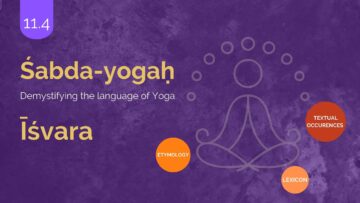….This is in continuation of Śabda-yoga -5
Introduction
In this series, Yogic terminologies will be taken up and their –
- Etymological analysis,
- Lexical descriptions and
- Textual occurrences in Yogic literature and their commentaries, as available, will be presented. And finally observations will be made on the references.
Three texts – Yogasūtra, Haṭha-yoga-pradīpikā and Bhagavad-gītā are consulted for textual occurrences portion.
Śabda-yoga is intended to help students, teachers, and professionals of Yoga to develop a sound grammatical, contextual, and thereby an authentic and immersive understanding of Yoga terminologies.
List of Words
The words that appear in the Yogasūtras will be sequentially dealt initially and then terms from other prominent Yoga texts will be taken up. This śabda-yoga article will analyze one term. The term for this article is
- jñāna
1.jñāna
Etymology
ज्ञा + ल्युट् = ज्ञानम्
jñā + lyuṭ =jñānam
- jñā is the root that (ज्ञाअवबोधने) means to know/understand
- Lyut is the suffix that is used to indicate the meaning “act” (Bhāva). The suffix is added based on the grammatical rule ल्युट्चlyuṭ ca (aṣṭādhyāyī 3.3.115)
The derivative statement is – ज्ञायतेइतिज्ञानम् – jñāyateitijñānam – The act of knowing is jñāna.
Lexicon
There is one reference to the term in Amarakośa –
मोक्षेधीर्ज्ञानम्1.5.6)
mokṣedhīrjñānam
jñāna refers to application of the mind in liberation
Though there are very wide connotations to the word jñāna (as could be seen from the subsequent Yogic textual references) Amarakośa indicates only a limited sense of the word.
Textual occurrences[1]
Yogasūtra
There are 20 occurrences of the term jñāna in this text – found in each of the chapters of the text. This indicates the importance of the word. But it has to be noted that the maxim (13) references are from the third Chapter. A chapter wise summary of the appearance of the expression is given below
Chapter 1
There are four occurrences to the term in this chapter (Sūtra 8,9,38,42)[2].
A brief description of the occurrence is as follows –
- mithyājñāna (1.8) – The context of this occurrence has been already elaborated while discussing the word mithyā, previously.
- Śabdajñāna (1.9) – Vikalpa activity of the mind is discussed as that which follows the knowledge from the word (Śabdajñāna) alone and there is no corresponding real object.
- Svapnanidrājñāna (1.38) – It is indicated herein that – the knowledge that one attains in dream and deep sleep can be used to calm and make the mind attain focus.
- Śabdārthajñānavikalpa (1.42) – Savitarkasamāpatti is defined herein. This state of samāpatti is one which contains an admixture of the word, object and knowledge – about the object of meditation.
Chapter 2
There are two occurrences of the word jñāna in this chapter (Sūtras 28, 34)[3]. A brief description of the two references are as follows –
- jñānadīpti (2.28) – glow of knowledge – is said to be attained by the practice of the limbs of Yoga.
- …ājñānānantaphala (2.34) – The process of pratipakṣabhāvana is advised in this aphorism to overcome vitarkās. As part of it, it is stated– one should remind oneself that – giving in to the Vitarkas (negative tendencies) leads to endless suffering, wrong knowledge (ājñāna).
Chapter 3
There are 13 references to the use of jñāna in this chapter(Sūtras 16-19, 22, 25-29, 35,52, 54).[4]
Various kinds of supra-sensory/special kinds of knowledge that are attained through the practice of various saṃyamas are discussed in this chapter. Twelve such special types of knowledge are presented in these 13 Sūtras. They are –
- atītānāgatajñānam (3.16) – knowledge of the past and future,
- sarvabhūtarutajñāna (3.17) – knowledge of meanings of sounds of various beings
- pūrvajātijñānam (3.18) – knowledge of the past birth,
- paracittajñānam (3.19) – knowledge about other’s mind,
- aparāntajñānam (3.22) – knowledge of the time of death,
- sūkṣmavyavahitaviprakṛṣṭajñānam (3.25) – knowledge of objects that are subtle, obstructed and far away,
- bhuvanajñānaṃ (3.26) – knowledge of the world,
- tārāvyūhajñānam (3.27) – knowledge of the arrangement of the stars/constellations,
- tad(tārā)gatijñānam (3.28) – knowledge of the movement of the stars.
- kāyavyūhajñānam (3.29) – knowledge of the arrangement of the (elements in) human body,
- puruṣajñānam (3.35) – knowledge of Puruṣa (consciousness),
- vivekajaṃjñānam (3.52,54) – knowledge arising out of discrimination.
Chapter 4
There is just one reference to jñāna in this chapter (Sūtra 31)[5]. jñānasya ā”nantyā – The endlessness of knowledge (jñāna) is stated here. This power manifests when the mind attains the state of DharmamehgaSamādhi. On attainment of this Dharmamegha – afflictions and actions wane and by that ability to know endlessly(the objects of the world) is attained.
It can be noted from the above references that knowledge in the context of Yogasūtrasis both the means and the end. To illustrate – while contemplating on svapnanidrājñāna (1.38) is a means to calmness and focus of the mind – the various types of supra-sensory knowledge mentioned in the third chapter – is the end attained by practice of various Samyamas.
Bhagavadgītā
There are 55 reference to the use of the wordjñāna in this text. The most occurrences among yoga texts consulted. Excepting chapters 1,2,8,11 & 17 – in the rest of the 13 chapters, the expression jñāna is found. This indicates the importance of the term in this text. A chapter-wise summary of the context of appearance of the term is presented below.
Chapter 3
There are six references (Verses 3, 32,33, 39-41)[6] to the term in this chapter.
- Verse 3 speaks about jñānayoga(knowledge of the ātman itself is Yoga) for sāṅkhyas(those who are able to discriminate the self from the non-self).
- In verse 32 it is stated that those who hate and the teachings on Karmayoga will be confused in all kinds of knowledge (sarvajñānavimūḍha)
- In verse 33 it is stated that even jñānavān a knowledgeable person (about the ātman) will not be able to transcend his innate tendencies.
- Verse 39 & 40 state that jñāna – knowledge (about the ātman) is clouded by the desire.
- In verse 41 again it is stated that desire destroys both jñāna (knowledge about the Ātman) Vijñāna (experiential understanding about the Ātman).
Chapter 4
4th Chapter is called as jñānayoga. True to its nomenclature, there are numerous references to the term jñāna (13 to be specific – Verses 10, 19, 23, 27, 28, 34, 36-39, 41, 42)[7]in this chapter.The summary of the references isbriefly presented below.
- jñānatapas (verse 10) – Here knowledge itself is stated as an act of self-disciplining (Tapas)that purifies
- jñānāgni (Verses 19 & 37) – in both reference the fire of knowledge is said to burn to ashes all actions.
- jñānāvasthitacetas (verse 23) – a person whose mind abides in the knowledge is glorified herein.
- Jñānadīpita (verse 27) – It is stated herein that the Yogic fire of self-regulation is kindled to glow well by the knowledge (of Ātman).
- jñānayajña (Verses 28, 33 ) – knowledge is termed as a yajña[8] (Verse 28) and this is said to be superior to all other forms of yajñas ( verse 33)
- jñānaplava (verse 36) – knowledge is stated as a boat/ship that helps cross the ocean of sins.
- jñānasañchinnasaṃśaya (verse 41) –It is stated here that – a person whose doubts are cut asunder by knowledge is not bound by the Karmas (actions & their consequences)
- jñānāsi(Verse 42) – Here knowledge is stated as a sword. A meaning similar to the previous verse is found here, where the sword of knowledge cuts asunder doubts (about the Ātman).
- jñāna (Verses 33, 34, 38) – While in all previous occasions in the chapter the word jñāna is used as part of a compound, here jñāna as such is used. It is stated that all actions culminate in knowledge (verse 33). It is also advised that knowledge is to be attained by salutations (to teacher), thorough questioning and service (of teacher) (verse 34). It is also mentioned that there is nothing purer than knowledge (verse 38).
It is to be noted here that the knowledge – jñāna –mentioned in all above occurrences- refer to the knowledge of pure conscious nature of the Ātman.
Chapter 5
There are three references to the word jñāna in this chapter (verses 15-17)[9]. The following is the brief description of the references –
- verse 15 – ajñānenāvṛtaṃjñānaṃ – here the it is stated that in reality the Supreme being does not accept the merits or sins of any individual. All such notions exist because knowledge is clouded by ignorance.
- Verse 16 – jñānenatutadajñānaṃ – It is stated here that – those who destroy their ignorance/wrong knowledge with knowledge – their knowledge shines like the sun.
- Verse 17 – It is mentioned here that – those who are totally dedicated to the cause of attainment of knowledge, certainly attain the state of no return (to life full of suffering) as their impurities are purified by knowledge.
Chapter 6
In this chapter there is just one reference to the usage of the word jñāna (verse 8)[10].
Its stated here that – jñānavijñānatṛptātmā (verse 8) –a person who has become satisfied by the knowledge and also the experiential understanding about the consciousness is called as Yukta (a person with a calm mind).
Chapter 7
There are 3 references to the usage of jñāna in this chapter (Verses 2,15,20)[11]. The context of appearances of the term is as follows –
- jñānaṃte’haṃsavijñānam (verse 2) – Lord Kṛṣṇa assures Arjuna that he will speak about knowledge and its experiential understanding (about the consciousness).
- māyayāpahṛtajñānā (verse 15) – It has been stated here that – knowledge of those people will be clouded, who indulge in misdeeds.
- kāmaistaistairhṛtajñānāḥ (verse 20) – Here also it has been stated that – various desires snatch away knowledge.
Chapter 9
There are three references to jñāna in this chapter (Verses 1, 12, 15)[12]. They are briefly described below –
- jñānaṃvijñānasahitaṃ (verse 1) – This seems to be preferred expression of Lord Kṛṣṇa in the Gītā where he speaks about granting knowledge (jñāna) and experiential understanding (vijñāna).
- Moghajñānā (verse 12 ) – The (theoretical) knowledge (about the consciousness) is stated to be of no use to those who cling on toāsuric tendencies which is of the nature of wrongly understanding body as the ātman.
- Jñānayajña (verse 15) – Lord Kṛṣṇa here states that there are many ways of expression of devotion to the divinity. Jñānayajña is one such path – a path where one tries to understand the nature of the Supreme being.
Chapter 10
There are three references to jñāna in this chapter (Verses 4, 11, 38)[13]. Summary of the three references is presented below –
- buddhirjñānam (verse 4) – The supreme Lord governs the entire universe as he possesses intellect that grasps subtle concepts, realization of consciousness etc and host of other superior qualities listed in the verse.
- Jñānadīpena (verse 11) – The Lord destroys the darkness born out of ignorance by the glowing light of knowledge.
- jñānaṃjñānavatāmaham (verse 38) – The supreme being is the knowledge among those who are endowed with knowledge.
Chapter 12
There is just one reference to jñāna in this Chapter (verse 12)[14].This verse praises renouncing of the results of actions. In that process – it progressively glorifies various paths to self-realization such as abhyāsa (practicing discernment), jñāna (knowledge about the consciousness), dhyāna (meditating upon that which has been known – the consciousness) andkarmaphalatyāga (renouncing the results of actions). as supreme in this context. Karmaphalatyāga is gloried as supreme among all these paths.
Chapter 13
There are five references to jñāna in this Chapter (Verses 2,11, 17, 18, 34)[15]. A summary on the occurrences is as follows –
- kṣetrakṣetrajñayorjñānaṃ (verse 2) – The knowledge of kṣetra (the material world and its material cause) and kṣetrajña (the knower/the individual consciousness) – is stated to be important by Lord Kṛṣṇa in this verse.
adhyātmajñānanityatvaṃ, tattvajñānārthadarśanam (verse 11) – Constantly pursuing the knowledge of consciousness and looking at/analyzing the outcome of spiritual practices are the intellectual practices that lead to real knowledge of the consciousness. - Jñāna (verse 17) – It has been stated here that jñānaṃ in the form of amānitva and other such virtues are already present in the heart of all beings (hence it is not difficult to attain)
- Jñāna (verse 18) – Jñāna/knowledge in this verse points to virtues such as amānitva (not being in the pursuit of praise), adambhitva (not being arrogant) that lead to the knowledge of the pure consciousness.
- jñānacakṣuṣ (the eye of knowledge) (verses 34) – This refers to the knowledge of the consciousness attained from the teacher and the scriptures. The verse states that those who are endowed with such eye of knowledge attain the supreme state.
Chapter 14
There are six references to jñāna in this Chapter (verses 1, 2, 6, 9, 11, 17)[16]. A brief description of the occurrences is as follows –
- jñānānāṃjñānamuttamam (verse 1 , 2) – The knowledge about the three guṇas, Sattva, Rajas and Tamas are said to be best among the knowledge(verse 1). This knowledge leads liberation (verse 2)
- jñānasaṅgena (verse 6, 17)– Sattva- guṇa is said to bind a person with knowledge (verse 6). In the same tone it has been stated that knowledge arises from Sattva (verse 17).
- jñānamāvṛtyatutamaḥ (verse 9) – Tamas is said to cloud knowledge.
- jñānaṃyadā (verse 11) – It has been stated here that when the light of intellect spreads in all senses (effortlessly) then one shall understand that there is dominance of Sattva.
Chapter 15
There are two references to jñāna in this chapter (verses 10, 15)[17]. The context of the occurrences is as follows –
- jñānacakṣuṣ (verse 10) – It has been stated that – those endowed with eye of knowledge can see the consciousness clearly while those deluded cannot.
- Jñāna (verse 15) – knowledge is a said to arise from the supreme being.
Chapter 16
There is just one reference to jñānain this chapter (Verse 16)[18]. It has been mentioned here that –
jñāna-yoga-vyavasthiti – Being established with single pointed focus on the knowledge of the consciousness – is stated as a divine quality in this verse.
Chapter 18
There are 8 references to the word jñāna in this chapter (Verses 18-21, 42,50, 63, 70)[19].A brief summary is as follows –
- jñāna (verse 18 )- It is said here that knowledge (Jñāna) is one among the constituents of karmacodanā (inspiration to do any action) along with object of knowledge and the knower.
- Jñāna (verse 19-22) – It is stated here that – the three-fold division of knowledge(Jñāna), action and doer are to be understood as being based on the three guṇas – Sattva, Rajas and Tamas (verse 19). Their descriptions are found in the subsequent verses (verse 20-22)[20].
- Jñāna (verse 42) – Jñāna (knowledge) is said to be one among the nine natural actions of a Brahmana in this verse
- niṣṭhājñānasya (verse 50) – the attainment of Brahman – is said to the highest state or extent of knowledge – in this verse.
- Jñāna (verse 63) – This is an important verse where Lord Kṛṣṇa states that thus far in the whole text, he has stated the most secretive knowledge and Arjuna has to analyze this completely and has to do as he desires.
- Jñānayajña (verse 70) – This verse states that the study of the conversation between Lord Kṛṣṇa and Arjuna is an act of Jñāna-yajña (an offering through knowledge) directed to the Supreme being.
It could be seen from the above references in the Gītā that the jñāna used here predominantly indicates the knowledge of the consciousness. Knowledge is glorified as the supremely purifying. Methods of attaining the knowledge from the wise by service, questioning and respecting them was indicated.
Further, many interesting and insightful compounds that has jñāna as a constituent has been used such as – jñānayajña, jñānayoga, jñānatapas, jñānāsi, jñānadīpa, jñānasaṅga. It also interesting to note the usage -jñānasaṅga – where knowledge is also stated as a bondage that has to be transcended.
Finally, the expression – jñānaṃvijñānasahitam – that has been mentioned in a couple of occasion – in the text indicates that this text considers that theoretical knowledge with experiential understanding as essential.
Haṭhayogapradīpikā –
There are six references to the word Jñāna in three chapters ( Verses 1.16, 3.53, 4.8,15,60, 114)[21]. A summary of the references is as follows –
- Tattvajñānā (Verse 1.16) – Herein knowledge of the truth (true nature of the consciousness) is counted as one among the factors of success in Yoga.
- jñānajanaka (Verse 3.53) – This reference to the word jñāna, is in the context of the practice called khecarīmudrā. It is stated here that khecarīmudrā is experienced in the suṣumnānāḍī which is said to generate knowledge (of the pure consciousness).
- Jñāna (4.8) –Rājayoga is glorified in this verse. This verse states that – Jñāna (knowledge of the pure consciousness), liberation, etc are stated to be attained byRājayoga
- Jñāna (4.15& 114) – It has been emphatically stated here that jñāna will not arise as long asprāṇa&Manas are active. Their operations are to subside to allow the glow of knowledge. (Verse 15). Verse 114 in the same chapter which is the concluding verse – while echoing the same meaning as has been stated in verse 15, is still more blunt when it says – without the control of the mind and the prāṇa all speech of knowledge is haughty false prattle (dambhamithyāpralāpa)
- Jñāna (4.60) – It has been stated here that all that is known, to be known and the process of knowing is only the Manas (the mind). If the mind is dissolved, there is no duality.
It could be observed here that – true to the structure of the text after discussing various practices of Yoga in the prior three chapters, inputs on knowledge is predominantly found in the fourth chapter that deals with Rājayoga.
Observations
As could be observed with the numerous references in the three Yogic texts consulted (20+55+6 = 81) the importance and centrality of the term – Jñāna is very much evident. But each of the text reveals very useful dimensions of Jñāna
- Yogasūtra – It is very interesting to note various insights on the three dimensions of knowledge in this text. Those these three categories are not stated explicitly.Observation of the pattern of the references indicate that Yogasūtra takes note of and discusses knowledge –mundane, supra-sensory and spiritual.
Bhagavadgītā- As evident from the references and their summary it could be observed that Bhagavadgītāis a veritable treasure trove of insightful inputs on knowledge of consciousness. The frameworks of knowledge such as definitions, classifications etc that are found in this text lend themselves to application of these insights in fields other than spiritualty also – such as education.
Haṭhayogapradīpikā – There is a general perception that Haṭhayoga is all about practice. The references on jñāna indicate the goal of haṭhayoga practices. It is also worth noting that – characteristically this text in a couple of occasions emphatically states that without practice that leads to regulation of the mind the breath – any talk of knowledge about the consciousness is dry and false prattle.
Though there is diversity of inputs from the three texts but one common thing that all texts seem to agree is that – theoretical knowledge and experiential understanding should go hand in hand.
References
- Advaitaśāradā – https://advaitasharada.sringeri.net/
- Amarakoṣasampat – http://amara.aupasana.com/
- Aṣṭādhyāyī – https://ashtadhyayi.com/
- Aksharamukha – https://aksharamukha.appspot.com/
- Avyayakośaḥ, śrīśrīvatsāṅkācāryaḥ, saṃskṛtavidyāsamitiḥ, chennai, 2004
- Gītā Supersite – https://www.Gītāsupersite.iitk.ac.in/
- Nāmaliṅgānuśāsana alias amarakoṣa of amarasiṃha with the commentary vyākhyāsudhā or rāmāśramī by bhānujidīkṣita, Edited with notes by M.M.PanditShivadattaDadimatha, ChaukhambaSaṃskṛtaPrathisthan, Delhi, Reprint 2002
- śabdārthakaustubha, cakravartīśrīnivāsagopālācārya, Vol 4, Bappco Publication, Bengaluru, Reprint 2009
- Yoga-vaiśāradī – https://kymyogavaisharadi.org/
[1] Note: As the quotes are too numerous on the term jñāna in Yoga texts, all the original quotes are given in the footnotes and the summary of the context of their occurrences is given in the main body.
[2]Sūtra 8,9,38,42
- विपर्ययो मिथ्याज्ञानमतद्रूपप्रतिष्ठम् ॥ १.८ ॥
viparyayomithyājñānamatadrūpapratiṣṭham .. 1.8 ..
- शब्दज्ञानानुपाती वस्तुशून्यो विकल्पः ॥१. ९ ॥
śabdajñānānupātīvastuśūnyovikalpaḥ ..1. 9 ..
- स्वप्ननिद्राज्ञानालम्बनं वा ॥ १.३८ ॥
svapnanidrājñānālambanaṃvā .. 1.38 ..
- तत्र शब्दार्थज्ञानविकल्पैः संकीर्णा सवितर्का समापत्तिः ॥ १.४२ ॥
tatraśabdārthajñānavikalpaiḥsaṃkīrṇāsavitarkāsamāpattiḥ .. 1.42 ..
[3]Sūtras 28, 34
- योगाङ्गानुष्ठानादशुद्धिक्षये ज्ञानदीप्तिराविवेकख्यातेः ॥ २.२८ ॥
yogāṅgānuṣṭhānādaśuddhikṣayejñānadīptirāvivekakhyāteḥ .. 2.28 ..
- वितर्का हिंसादयः कृतकारितानुमोदिता लोभक्रोधमोहपूर्वका मृदुमध्याधिमात्रा दुःखाज्ञानानन्तफला इति प्रतिपक्षभावनम् ॥ २.३४ ॥
vitarkāhiṃsādayaḥkṛtakāritānumoditālobhakrodhamohapūrvakāmṛdumadhyādhimātrāduḥkhājñānānantaphalāitipratipakṣabhāvanam .. 2.34 ..
[4]Sūtras 16-19, 22, 25-29, 35,52, 54
- परिणामत्रयसंयमादतीतानागतज्ञानम् ॥ ३.१६ ॥
pariṇāmatrayasaṃyamādatītānāgatajñānam .. 3.16 ..
- शब्दार्थप्रत्ययानामितरेतराध्यासात्संकरस्तत्प्रविभागसंयमात्सर्वभूतरुतज्ञानम् ॥ ३.१७ ॥
śabdārthapratyayānāmitaretarādhyāsātsaṃkarastatpravibhāgasaṃyamātsarvabhūtarutajñānam .. 3.17 ..
- संस्कारसाक्षात्करणात्पूर्वजातिज्ञानम् ॥ ३.१८ ॥saṃskārasākṣātkaraṇātpūrvajātijñānam .. 3.18 ..
- प्रत्ययस्य परचित्तज्ञानम् ॥ ३.१९ ॥pratyayasyaparacittajñānam .. 3.19 ..
- सोपक्रमं निरुपक्रमं च कर्म तत्संयमादपरान्तज्ञानमरिष्टेभ्यो वा ॥ ३.२२ ॥
sopakramaṃnirupakramaṃ ca karma tatsaṃyamādaparāntajñānamariṣṭebhyovā 3.22
- प्रवृत्त्यालोकन्यासात्सूक्ष्मव्यवहितविप्रकृष्टज्ञानम् ॥ ३.२५ ॥
pravṛttyālokanyāsātsūkṣmavyavahitaviprakṛṣṭajñānam .. 3.25 ..
- भुवनज्ञानं सूर्ये संयमात् ॥ ३.२६ ॥bhuvanajñānaṃsūryesaṃyamāt .. 3.26 ..
- चन्द्रे ताराव्यूहज्ञानम् ॥ ३.२७ ॥candretārāvyūhajñānam .. 3.27 ..
- ध्रुवे तद्गतिज्ञानम् ॥ ३.२८ ॥dhruvetadgatijñānam .. 3.28 ..
- नाभिचक्रे कायव्यूहज्ञानम् ॥ ३.२९ ॥nābhicakrekāyavyūhajñānam .. 3.29 ..
- सत्त्वपुरुषयोरत्यन्तासंकीर्णयोः प्रत्ययाविशेषो भोगः परार्थात्स्वार्थसंयमात्पुरुषज्ञानम् ॥ ३.३५ ॥
sattvapuruṣayoratyantāsaṃkīrṇayoḥpratyayāviśeṣobhogaḥparārthātsvārthasaṃyamātpuruṣajñānam .. 3.35 ..
- क्षणतत्क्रमयोः संयमाद्विवेकजं ज्ञानम् ॥ ३.५२ ॥
kṣaṇatatkramayoḥsaṃyamādvivekajaṃjñānam .. 3.52 ..
- तारकं सर्वविषयं सर्वथाविषयमक्रमं चेति विवेकजं ज्ञानम् ॥ ३.५४ ॥
tārakaṃsarvaviṣayaṃsarvathāviṣayamakramaṃcetivivekajaṃjñānam .. 3.54 ..
[5] Sutra 31
- तदा सर्वावरणमलापेतस्य ज्ञानस्याऽऽनन्त्याज्ज्ञेयमल्पम् ॥ ४.३१ ॥
tadāsarvāvaraṇamalāpetasyajñānasyā”nantyājjñeyamalpam .. 4.31 ..
[6]Verses 3, 32,33, 39-41
1.लोकेऽस्मिन्द्विविधा निष्ठा पुरा प्रोक्ता मयानघ ।
ज्ञानयोगेन साङ्ख्यानां कर्मयोगेन योगिनाम् ॥ ३ ॥
loke’smindvividhāniṣṭhāpurāproktāmayānagha .
jñānayogenasāṅkhyānāṃkarmayogenayoginām .. 3 ..
- ये त्वेतदभ्यसूयन्तो नानुतिष्ठन्ति मे मतम् ।
सर्वज्ञानविमूढांस्तान्विद्धि नष्टानचेतसः ॥ ३२ ॥
ye tvetadabhyasūyantonānutiṣṭhanti me matam .
sarvajñānavimūḍhāṃstānviddhinaṣṭānacetasaḥ .. 32 ..
- सदृशं चेष्टते स्वस्याः प्रकृतेर्ज्ञानवानपि ।
प्रकृतिं यान्ति भूतानि निग्रहः किं करिष्यति ॥ ३३ ॥
sadṛśaṃceṣṭatesvasyāḥprakṛterjñānavānapi .
prakṛtiṃyāntibhūtāninigrahaḥkiṃkariṣyati .. 33 ..
- आवृतं ज्ञानमेतेन ज्ञानिनो नित्यवैरिणा ।
कामरूपेण कौन्तेय दुष्पूरेणानलेन च ॥ ३९
āvṛtaṃjñānametenajñāninonityavairiṇā .
kāmarūpeṇakaunteyaduṣpūreṇānalena ca .. 39
- इन्द्रियाणि मनो बुद्धिरस्याधिष्ठानमुच्यते ।
एतैर्विमोहयत्येष ज्ञानमावृत्य देहिनम् ॥ ४० ॥
indriyāṇimanobuddhirasyādhiṣṭhānamucyate .
etairvimohayatyeṣajñānamāvṛtyadehinam .. 40 ..
- तस्मात्त्वमिन्द्रियाण्यादौ नियम्य भरतर्षभ ।
पाप्मानं प्रजहिह्येनं ज्ञानविज्ञाननाशनम् ॥ ४१ ॥
tasmāttvamindriyāṇyādauniyamyabharatarṣabha .
pāpmānaṃprajahihyenaṃjñānavijñānanāśanam .. 41 ..
[7]Verses 10, 19, 23, 27, 28, 34, 36-39, 41, 42
- वीतरागभयक्रोधा मन्मया मामुपाश्रिताः ।
बहवो ज्ञानतपसा पूता मद्भावमागताः ॥ १० ॥
vītarāgabhayakrodhāmanmayāmāmupāśritāḥ .
bahavojñānatapasāpūtāmadbhāvamāgatāḥ .. 10 ..
- यस्य सर्वे समारम्भाः कामसङ्कल्पवर्जिताः ।
ज्ञानाग्निदग्धकर्माणं तमाहुः पण्डितं बुधाः ॥ १९ ॥
yasyasarvesamārambhāḥkāmasaṅkalpavarjitāḥ .
jñānāgnidagdhakarmāṇaṃtamāhuḥpaṇḍitaṃbudhāḥ .. 19 ..
- गतसङ्गस्य मुक्तस्य ज्ञानावस्थितचेतसः ।
यज्ञायाचरतः कर्म समग्रं प्रविलीयते ॥ २३ ॥
gatasaṅgasyamuktasyajñānāvasthitacetasaḥ .
yajñāyācarataḥ karma samagraṃpravilīyate .. 23 ..
- सर्वाणीन्द्रियकर्माणि प्राणकर्माणि चापरे ।
आत्मसंयमयोगाग्नौ जुह्वति ज्ञानदीपिते ॥ २७ ॥
sarvāṇīndriyakarmāṇiprāṇakarmāṇicāpare .
ātmasaṃyamayogāgnaujuhvatijñānadīpite .. 27 ..
- द्रव्ययज्ञास्तपोयज्ञा योगयज्ञास्तथापरे ।
स्वाध्यायज्ञानयज्ञाश्च यतयः संशितव्रताः ॥ २८ ॥
dravyayajñāstapoyajñāyogayajñāstathāpare .
svādhyāyajñānayajñāścayatayaḥsaṃśitavratāḥ .. 28 ..
- श्रेयान्द्रव्यमयाद्यज्ञाज्ज्ञानयज्ञः परन्तप ।
सर्वं कर्माखिलं पार्थ ज्ञाने परिसमाप्यते ॥ ३३ ॥
śreyāndravyamayādyajñājjñānayajñaḥparantapa .
sarvaṃkarmākhilaṃpārthajñāneparisamāpyate .. 33 ..
- तद्विद्धि प्रणिपातेन परिप्रश्नेन सेवया ।
उपदेक्ष्यन्ति ते ज्ञानं ज्ञानिनस्तत्त्वदर्शिनः ॥ ३४ ॥
tadviddhipraṇipātenaparipraśnenasevayā .
upadekṣyantitejñānaṃjñāninastattvadarśinaḥ .. 34 ..
- अपि चेदसि पापेभ्यः सर्वेभ्यः पापकृत्तमः ।
सर्वं ज्ञानप्लवेनैव वृजिनं सन्तरिष्यसि ॥ ३६ ॥
apicedasipāpebhyaḥsarvebhyaḥpāpakṛttamaḥ .
sarvaṃjñānaplavenaivavṛjinaṃsantariṣyasi .. 36 ..
- यथैधांसि समिद्धोऽग्निर्भस्मसात्कुरुतेऽर्जुन ।
ज्ञानाग्निः सर्वकर्माणि भस्मसात्कुरुते तथा ॥ ३७ ॥
yathaidhāṃsisamiddho’gnirbhasmasātkurute’rjuna .
jñānāgniḥsarvakarmāṇibhasmasātkurutetathā .. 37 ..
- न हि ज्ञानेन सदृशं पवित्रमिह विद्यते ।
तत्स्वयं योगसंसिद्धः कालेनात्मनि विन्दति ॥ ३८ ॥
na hi jñānenasadṛśaṃpavitramihavidyate .
tatsvayaṃyogasaṃsiddhaḥkālenātmanivindati .. 38 ..
- श्रद्धावांल्लभते ज्ञानं तत्परः संयतेन्द्रियः ।
ज्ञानं लब्ध्वा परां शान्तिमचिरेणाधिगच्छति ॥ ३९ ॥
śraddhāvāṃllabhatejñānaṃtatparaḥsaṃyatendriyaḥ .
jñānaṃlabdhvāparāṃśāntimacireṇādhigacchati .. 39 ..
- योगसंन्यस्तकर्माणं ज्ञानसञ्छिन्नसंशयम् ।
आत्मवन्तं न कर्माणि निबध्नन्ति धनञ्जय ॥ ४१ ॥
yogasaṃnyastakarmāṇaṃjñānasañchinnasaṃśayam .
ātmavantaṃnakarmāṇinibadhnantidhanañjaya .. 41 ..
- तस्मादज्ञानसम्भूतं हृत्स्थं ज्ञानासिनात्मनः ।
छित्त्वैनं संशयं योगमातिष्ठोत्तिष्ठ भारत ॥ ४२ ॥
tasmādajñānasambhūtaṃhṛtsthaṃjñānāsinātmanaḥ .
chittvainaṃsaṃśayaṃyogamātiṣṭhottiṣṭhabhārata .. 42 ..
[8] A Vedic performance where offering is made to divinity by forgoing ownership in what is being offered. Yajña in general denotes the attitude of selflessly offering something to others.
[9] Verses 15-17
- नादत्ते कस्यचित्पापं न चैव सुकृतं विभुः ।
अज्ञानेनावृतं ज्ञानं तेन मुह्यन्ति जन्तवः ॥ १५ ॥
nādattekasyacitpāpaṃnacaivasukṛtaṃvibhuḥ .
ajñānenāvṛtaṃjñānaṃtenamuhyantijantavaḥ .. 15 ..
- ज्ञानेन तु तदज्ञानं येषां नाशितमात्मनः ।
तेषामादित्यवज्ज्ञानं प्रकाशयति तत्परम् ॥ १६ ॥
jñānenatutadajñānaṃyeṣāṃnāśitamātmanaḥ .
teṣāmādityavajjñānaṃprakāśayatitatparam .. 16 ..
- तद्बुद्धयस्तदात्मानस्तन्निष्ठास्तत्परायणाः ।
गच्छन्त्यपुनरावृत्तिं ज्ञाननिर्धूतकल्मषाः ॥ १७ ॥
tadbuddhayastadātmānastanniṣṭhāstatparāyaṇāḥ .
gacchantyapunarāvṛttiṃjñānanirdhūtakalmaṣāḥ .. 17 ..
[10] Verse 8
ज्ञानविज्ञानतृप्तात्मा कूटस्थो विजितेन्द्रियः ।
युक्त इत्युच्यते योगी समलोष्टाश्मकाञ्चनः ॥ ८ ॥
jñānavijñānatṛptātmākūṭasthovijitendriyaḥ .
yuktaityucyateyogīsamaloṣṭāśmakāñcanaḥ .. 8 ..
[11]Verses 2,15,20 –
- ज्ञानं तेऽहं सविज्ञानमिदं वक्ष्याम्यशेषतः ।
यज्ज्ञात्वा नेह भूयोऽन्यज्ज्ञातव्यमवशिष्यते ॥ २ ॥
jñānaṃte’haṃsavijñānamidaṃvakṣyāmyaśeṣataḥ .
yajjñātvānehabhūyo’nyajjñātavyamavaśiṣyate .. 2 ..
- न मां दुष्कृतिनो मूढाः प्रपद्यन्ते नराधमाः ।
माययापहृतज्ञाना आसुरं भावमाश्रिताः ॥ १५ ॥
namāṃduṣkṛtinomūḍhāḥprapadyantenarādhamāḥ .
māyayāpahṛtajñānāāsuraṃbhāvamāśritāḥ .. 15 ..
- कामैस्तैस्तैर्हृतज्ञानाः प्रपद्यन्तेऽन्यदेवताः ।
तं तं नियममास्थाय प्रकृत्या नियताः स्वया ॥ २० ॥
kāmaistaistairhṛtajñānāḥprapadyante’nyadevatāḥ .
taṃtaṃniyamamāsthāyaprakṛtyāniyatāḥsvayā .. 20 ..
[12]Verses 1, 12, 15
- इदं तु ते गुह्यतमं प्रवक्ष्याम्यनसूयवे ।
ज्ञानं विज्ञानसहितं यज्ज्ञात्वा मोक्ष्यसेऽशुभात् ॥ १ ॥
daṃtuteguhyatamaṃpravakṣyāmyanasūyave .
jñānaṃvijñānasahitaṃyajjñātvāmokṣyase’śubhāt .. 1 ..
- मोघाशा मोघकर्माणो मोघज्ञाना विचेतसः ।
राक्षसीमासुरीं चैव प्रकृतिं मोहिनीं श्रिताः ॥ १२ ॥
moghāśāmoghakarmāṇomoghajñānāvicetasaḥ .
rākṣasīmāsurīṃcaivaprakṛtiṃmohinīṃśritāḥ .. 12 ..
- ज्ञानयज्ञेन चाप्यन्ये यजन्तो मामुपासते ।
एकत्वेन पृथक्त्वेन बहुधा विश्वतोमुखम् ॥ १५ ॥
jñānayajñenacāpyanyeyajantomāmupāsate .
ekatvenapṛthaktvenabahudhāviśvatomukham .. 15 ..
[13]Verses 4, 11, 38
- बुद्धिर्ज्ञानमसंमोहः क्षमा सत्यं दमः शमः ।
सुखं दुःखं भवोऽभावो भयं चाभयमेव च ॥ ४ ॥
buddhirjñānamasaṃmohaḥkṣamāsatyaṃdamaḥśamaḥ .
sukhaṃduḥkhaṃbhavo’bhāvobhayaṃcābhayameva ca .. 4 ..
- तेषामेवानुकम्पार्थमहमज्ञानजं तमः ।
नाशयाम्यात्मभावस्थो ज्ञानदीपेन भास्वता ॥ ११ ॥
teṣāmevānukampārthamahamajñānajaṃtamaḥ .
nāśayāmyātmabhāvasthojñānadīpenabhāsvatā .. 11 ..
- दण्डो दमयतामस्मि नीतिरस्मि जिगीषताम् ।
मौनं चैवास्मि गुह्यानां ज्ञानं ज्ञानवतामहम् ॥ ३८ ॥
daṇḍodamayatāmasminītirasmijigīṣatām .
maunaṃcaivāsmiguhyānāṃjñānaṃjñānavatāmaham .. 38 ..
[14] Verse 12 –
श्रेयो हि ज्ञानमभ्यासाज्ज्ञानाद्ध्यानं विशिष्यते ।
ध्यानात्कर्मफलत्यागस्त्यागाच्छान्तिरनन्तरम् ॥ १२ ॥
śreyo hi jñānamabhyāsājjñānāddhyānaṃviśiṣyate .
dhyānātkarmaphalatyāgastyāgācchāntiranantaram .. 12 ..
[15]Verses 2,11, 17, 18, 34 –
- क्षेत्रज्ञं चापि मां विद्धि सर्वक्षेत्रेषु भारत ।
क्षेत्रक्षेत्रज्ञयोर्ज्ञानं यत्तज्ज्ञानं मतं मम ॥ २ ॥
kṣetrajñaṃcāpimāṃviddhisarvakṣetreṣubhārata .
kṣetrakṣetrajñayorjñānaṃyattajjñānaṃmataṃ mama .. 2 ..
- अध्यात्मज्ञाननित्यत्वं तत्त्वज्ञानार्थदर्शनम् ।
एतज्ज्ञानमिति प्रोक्तमज्ञानं यदतोऽन्यथा ॥ ११ ॥
adhyātmajñānanityatvaṃtattvajñānārthadarśanam .
etajjñānamitiproktamajñānaṃyadato’nyathā .. 11 ..
- ज्योतिषामपि तज्ज्योतिस्तमसः परमुच्यते ।
ज्ञानं ज्ञेयं ज्ञानगम्यं हृदि सर्वस्य विष्ठितम् ॥ १७ ॥
jyotiṣāmapitajjyotistamasaḥparamucyate .
jñānaṃjñeyaṃjñānagamyaṃhṛdisarvasyaviṣṭhitam .. 17 ..
- इति क्षेत्रं तथा ज्ञानं ज्ञेयं चोक्तं समासतः ।
मद्भक्त एतद्विज्ञाय मद्भावायोपपद्यते ॥ १८ ॥
itikṣetraṃtathājñānaṃjñeyaṃcoktaṃsamāsataḥ .
madbhaktaetadvijñāyamadbhāvāyopapadyate .. 18 ..
- क्षेत्रक्षेत्रज्ञयोरेवमन्तरं ज्ञानचक्षुषा ।
भूतप्रकृतिमोक्षं च ये विदुर्यान्ति ते परम् ॥ ३४ ॥
kṣetrakṣetrajñayorevamantaraṃjñānacakṣuṣā .
bhūtaprakṛtimokṣaṃ ca ye viduryāntiteparam .. 34 ..
[16]Verses 1, 2, 6, 9, 11, 17 –
- परं भूयः प्रवक्ष्यामि ज्ञानानां ज्ञानमुत्तमम् ।
यज्ज्ञात्वा मुनयः सर्वे परां सिद्धिमितो गताः ॥ १ ॥
paraṃbhūyaḥpravakṣyāmijñānānāṃjñānamuttamam .
yajjñātvāmunayaḥsarveparāṃsiddhimitogatāḥ .. 1 ..
- इदं ज्ञानमुपाश्रित्य मम साधर्म्यमागताः ।
सर्गेऽपि नोपजायन्ते प्रलये न व्यथन्ति च ॥ २ ॥
daṃjñānamupāśritya mama sādharmyamāgatāḥ .
sarge’pinopajāyantepralayenavyathanti ca ..2 .
- तत्र सत्त्वं निर्मलत्वात्प्रकाशकमनामयम् ।
सुखसङ्गेन बध्नाति ज्ञानसङ्गेन चानघ ॥ ६ ॥
tatrasattvaṃnirmalatvātprakāśakamanāmayam .
sukhasaṅgenabadhnātijñānasaṅgenacānagha .. 6 ..
- सत्त्वं सुखे सञ्जयति रजः कर्मणि भारत ।
ज्ञानमावृत्य तु तमः प्रमादे सञ्जयत्युत ॥ ९ ॥
sattvaṃsukhesañjayatirajaḥkarmaṇibhārata .
jñānamāvṛtyatutamaḥpramādesañjayatyuta .. 9 ..
- सर्वद्वारेषु देहेऽस्मिन्प्रकाश उपजायते ।
ज्ञानं यदा तदा विद्याद्विवृद्धं सत्त्वमित्युत ॥ ११ ॥
sarvadvāreṣudehe’sminprakāśaupajāyate .
jñānaṃyadātadāvidyādvivṛddhaṃsattvamityuta .. 11 ..
- सत्त्वात्सञ्जायते ज्ञानं रजसो लोभ एव च ।
प्रमादमोहौ तमसो भवतोऽज्ञानमेव च ॥ १७ ॥
sattvātsañjāyatejñānaṃrajasolobhaevaca .
pramādamohautamasobhavato’jñānameva ca .. 17 ..
[17]verses 10, 15
- उत्क्रामन्तंस्थितंवापिभुञ्जानंवागुणान्वितम्।
विमूढानानुपश्यन्तिपश्यन्तिज्ञानचक्षुषः॥१०॥
utkrāmantaṃsthitaṃvāpibhuñjānaṃvāguṇānvitam .
vimūḍhānānupaśyantipaśyantijñānacakṣuṣaḥ .. 10 ..
- सर्वस्यचाहंहृदिसंनिविष्टोमत्तःस्मृतिर्ज्ञानमपोहनंच।
वेदैश्चसर्वैरहमेववेद्योवेदान्तकृद्वेदविदेवचाहम्॥१५॥
sarvasyacāhaṃhṛdisaṃniviṣṭomattaḥsmṛtirjñānamapohanaṃca .
vedaiścasarvairahamevavedyovedāntakṛdvedavidevacāham .. 15 ..
[18]Verse 16
अभयं सत्त्वसंशुद्धिर्ज्ञानयोगव्यवस्थितिः ।
दानं दमश्च यज्ञश्च स्वाध्यायस्तप आर्जवम् ॥ १ ॥
abhayaṃsattvasaṃśuddhirjñānayogavyavasthitiḥ .
dānaṃdamaścayajñaścasvādhyāyastapaārjavam .. 1 ..
[19]Verses 18-21, 42,50, 63, 70
- ज्ञानं ज्ञेयं परिज्ञाता त्रिविधा कर्मचोदना ।
करणं कर्म कर्तेति त्रिविधः कर्मसङ्ग्रहः ॥ १८ ॥
jñānaṃjñeyaṃparijñātātrividhākarmacodanā .
karaṇaṃ karma kartetitrividhaḥkarmasaṅgrahaḥ .. 18 ..
- ज्ञानं कर्म च कर्ता च त्रिधैव गुणभेदतः ।
प्रोच्यते गुणसङ्ख्याने यथावच्छृणु तान्यपि ॥ १९ ॥
jñānaṃ karma ca kartā ca tridhaivaguṇabhedataḥ .
procyateguṇasaṅkhyāneyathāvacchṛṇutānyapi .. 19 ..
- सर्वभूतेषु येनैकं भावमव्ययमीक्षते ।
अविभक्तं विभक्तेषु तज्ज्ञानं विद्धि सात्त्विकम् ॥ २० ॥
arvabhūteṣuyenaikaṃbhāvamavyayamīkṣate .
avibhaktaṃvibhakteṣutajjñānaṃviddhisāttvikam .. 20 ..
- पृथक्त्वेन तु यज्ज्ञानं नानाभावान्पृथग्विधान् ।
वेत्ति सर्वेषु भूतेषु तज्ज्ञानं विद्धि राजसम् ॥ २१ ॥
pṛthaktvenatuyajjñānaṃnānābhāvānpṛthagvidhān .
vettisarveṣubhūteṣutajjñānaṃviddhirājasam .. 21 ..
- शमो दमस्तपः शौचं क्षान्तिरार्जवमेव च ।
ज्ञानं विज्ञानमास्तिक्यं ब्रह्मकर्म स्वभावजम् ॥ ४२ ॥
śamodamastapaḥśaucaṃkṣāntirārjavamevaca .
jñānaṃvijñānamāstikyaṃbrahmakarmasvabhāvajam .. 42 ..
- सिद्धिं प्राप्तो यथा ब्रह्म तथाप्नोति निबोध मे ।
समासेनैव कौन्तेय निष्ठा ज्ञानस्य या परा ॥ ५० ॥
siddhiṃprāptoyathā brahma tathāpnotinibodhame .
samāsenaivakaunteyaniṣṭhājñānasyayāparā .. 50 ..
- इति ते ज्ञानमाख्यातं गुह्याद्गुह्यतरं मया ।
विमृश्यैतदशेषेण यथेच्छसि तथा कुरु ॥ ६३ ॥
ititejñānamākhyātaṃguhyādguhyataraṃmayā .
vimṛśyaitadaśeṣeṇayathecchasitathākuru .. 63 ..
- अध्येष्यते च य इमं धर्म्यं संवादमावयोः ।
ज्ञानयज्ञेन तेनाहमिष्टः स्यामिति मे मतिः ॥ ७० ॥
adhyeṣyate ca yaimaṃdharmyaṃsaṃvādamāvayoḥ .
jñānayajñenatenāhamiṣṭaḥsyāmiti me matiḥ .. 70 ..
[20]Verse 22 does not use the word Jñāna, hence it has not been given above.
[21]Verses 1.16, 3.53, 4.8,15,60, 114
- उत्साहात् साहसात् धैर्यात् तत्त्वज्ञानाच्च निश्चयात् ।
जनसङ्गपरित्यागात् षड्भिर्योगः प्रसिद्ध्यति ॥ १.१६ ॥
utsāhātsāhasātdhairyāttattvajñānāccaniścayāt .
janasaṅgaparityāgātṣaḍbhiryogaḥprasiddhyati ..1.16 ..
- सुषिरं ज्ञानजनकं पञ्चस्रोतःसमन्वितम् ।
तिष्ठते खेचरीमुद्रा तस्मिन् शून्ये निरञ्जने ॥ ३.५३ ॥
suṣiraṃjñānajanakaṃpañcasrotaḥsamanvitam .
tiṣṭhatekhecarīmudrātasminśūnyenirañjane .. 3.53 ..
- राजयोगस्य माहात्म्यं को वा जानाति तत्त्वतः ।
ज्ञानं मुक्तिः स्थितिः सिद्धिः गुरुवाक्येन लभ्यते ॥ ४.८ ॥
rājayogasyamāhātmyaṃkovājānātitattvataḥ .
jñānaṃmuktiḥsthitiḥsiddhiḥguruvākyenalabhyate .. 4.8 ..
- ज्ञानं कुतो मनसि संभवतीह तावत्
प्राणोऽपि जीवति मनो म्रियते न यावत् ।
प्राणो मनो द्वयमिदं विलयं नयेद् यो
मोक्षं स गच्छति नरो न कथञ्चिदन्यः ॥ ४.१५ ॥
jñānaṃkutomanasisaṃbhavatīhatāvat
prāṇo’pijīvatimanomriyatenayāvat .
prāṇomanodvayamidaṃvilayaṃnayedyo
mokṣaṃsagacchatinaronakathañcidanyaḥ .. 4.15 ..
- ज्ञेयं सर्वं प्रतीतं च ज्ञानं च मन उच्यते ।
ज्ञानं ज्ञेयं समं नष्टं नान्यः पन्था द्वितीयकः ॥ ४.६० ॥
jñeyaṃsarvaṃpratītaṃ ca jñānaṃ ca mana ucyate .
jñānaṃjñeyaṃsamaṃnaṣṭaṃnānyaḥpanthādvitīyakaḥ .. 4.60..
- यावन्नैव प्रविशति चरन्मारुतो मध्यमार्गे
यावद् बिन्दुर्न भवति दृढः प्राणवातप्रबन्धात् ।
यावद् ध्याने सहजसदृशं जायते नैव तत्त्वम्
तावज्ज्ञानं वदति तदिदं दम्भमिथ्याप्रलापः ॥ ॥ ४.११४ ॥
yāvannaivapraviśaticaranmārutomadhyamārge
yāvadbindurnabhavatidṛḍhaḥprāṇavātaprabandhāt .
yāvaddhyānesahajasadṛśaṃjāyatenaivatattvam
tāvajjñānaṃvadatitadidaṃdambhamithyāpralāpaḥ .. 114 ..
Feature Image Credit:istockphoto.com
Disclaimer: The opinions expressed in this article belong to the author. Indic Today is neither responsible nor liable for the accuracy, completeness, suitability, or validity of any information in the article.











